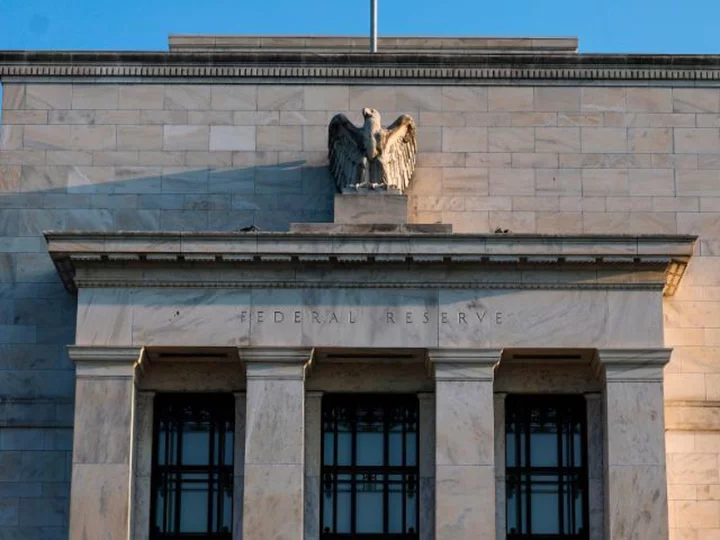America's first inflation crisis in decades, combined with the Federal Reserve's aggressive interest rate hikes to combat it, has made for a topsy-turvy past couple years on Main Street and Wall Street alike. It has weighed on consumers and kept investors constantly second-guessing themselves.
But some analysts say the Fed's influence on the economy isn't as profound as it used to be. Sure, markets will still react sharply when the Fed announces its new policy decisions, they say, but the lasting effects on stock prices and inflation are becoming increasingly stifled.
What's happening: After 18 months of a Fed-policy-induced rollercoaster ride, investors are ready for things to be boring again.
And the Fed is, too.
Fed Chair Jerome Powell hinted that the central bank was no longer controlling the inflation story during his speech at the Economic Club of New York last week, said Joe Brusuelas, RSM US chief economist.
That's a noted change in tone from March 2022 when the Fed ended its almost 15-year trend of maintaining low interest rates and introduced a series of aggressive rate hikes aimed at curbing historically high inflation.
For investors who were accustomed to near-zero rates, this was a major shift. It led to pronounced responses in the stock market and the broader economy.
But inflation has since reduced considerably, and there's no longer a need for such drastic measures.
The Fed, said Powell last week, is unwilling to make big moves and risk "unnecessary harm to the economy."
The market has already discounted the next Fed meeting, which begins on Halloween, as a "status quo policy update," said Brusuelas. In other words: Don't expect a rate hike this month. Financial markets currently see a nearly 99% chance the Fed will continue to pause rate increases in November, according to the CME FedWatch Tool.
Helping the Fed's cause: The 10-year Treasury yield has been hovering around 5% in recent days, its highest level since 2007. That rate influences consumer loans, including mortgages and credit cards, and is helping to weigh on consumer spending.
That means the Fed may not need to continue aggressively raising rates to bring spending — and inflation — down.
Inflation is starting to normalize: The US Consumer Price Index, a widely used measure of inflation, has decelerated significantly since it shot up above 9% in June 2022, although inflation has picked up again lately as volatile gas and food prices edge higher. But excluding food and energy, so-called core CPI stands at 4.1%, the lowest annual growth rate for that metric in two years, though still above the Fed's ultimate 2% target rate.
Some economists say that inflation is no longer considered an emergency issue. That means the Federal Reserve feels less pressure to quickly stabilize prices through aggressive, economically painful interest rate hikes.
"Once inflation gets down below 5%. It disappears from the headlines," Johns Hopkins economist and central bank scholar Laurence Ball previously told Before the Bell. "People go back to worrying about budget deficits or climate change or other public issues there are."
Some Walgreens pharmacy workers say they are planning another walkout
Some pharmacy workers at Walgreens, one of the nation's largest drugstore chains, say they are planning another walkout at the end of October, and organizers are hoping this time the protest spreads nationwide.
Workers have already been staging walkouts in scattered cities to protest working conditions that they say put customer safety at risk. The actions so far this month closed a handful of pharmacies briefly, and slowed business at several others; Walgreens told CNN the impact has been "minimal."
Now some pharmacy staff and organizers in multiple states have confirmed to CNN that they're planning another walkout, and picket lines, with a window from October 30 to November 1 to protest staffing levels and other issues.
Shane Jerominski, an independent pharmacist who used to work for Walgreens and is one of the walkout's organizers, told CNN that he has been working with representatives from unions to plan demonstrations beginning the day before Halloween — a particularly busy time for pharmacy chains as cold and flu season begins and demand for vaccinations soars.
A spokesperson from the United Food and Commercial Workers International Union told CNN that they support the organizers planning a walkout and protests. So does SEIU-United Healthcare Workers West.
Organizers told CNN that they're still holding out hope that Walgreens will work with them to reach a solution to problems they say range from understaffing to a rapidly expanding workload and low pay.
In a statement to CNN, Walgreens said about 20 stores out of about 9,000 had "disruptions over three days," Oct. 9-11. Walgreens walkout organizers told CNN that their tally is much higher, with about 600 employees participating.
Walgreens just named a new CEO, Tim Wentworth, who praised pharmacists during the company's Oct. 12 earnings call — but made no mention of the walkouts the previous days. Walgreens also announced that it expected to cut at least another $1 billion in costs next year. Shares of the company have fallen over the last year, to about $21 at Friday's close from $41 in November 2022.
Meanwhile, the company told CNN that it won't "speculate on potential workforce disruptions," and added that "our ongoing efforts since the onset of the pandemic have included an emphasis on how we recruit, retain, and reward our pharmacy staff."
Kim Kardashian is making Skims for men
Skims, the underwear and apparel brand founded by Kim Kardashian, is hoping to attract new customers: men.
The four-year-old shapewear brand is expanding beyond female clothing and into men's products, with a new lineup launching Thursday that includes briefs, undershirts, boxers and leggings. Prices range from $16 to $54 depending on the item. Men's sizes will also encompass Skims' body positivity focus and stretch from extra small to 5X.
Expanding into menswear is also a possible prelude to an initial public offering for the company, however nothing has officially been announced.

